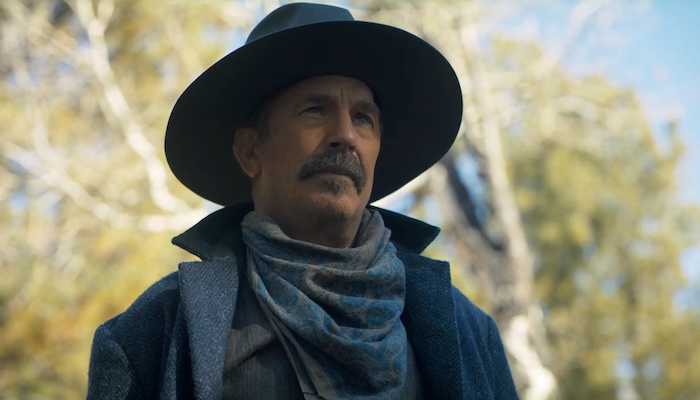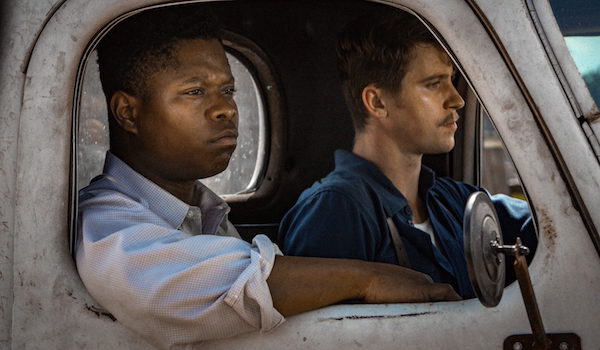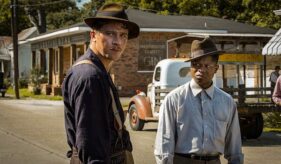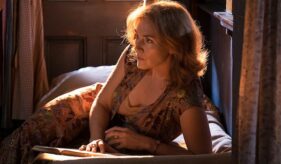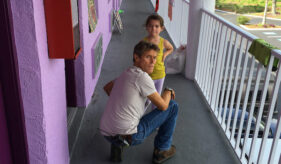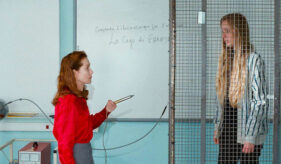Film Review: MUDBOUND (2017): Interconnection In The Growing Delta [NYFF 2017]
Table of Contents
Mudbound Review
Mudbound (2017) Film Review from the 55th Annual New York Film Festival, a movie directed by Dee Rees, starring Carey Mulligan, Garrett Hedlund, Jonathan Banks, Jason Clarke, Jason Mitchell, Kerry Cahill, Rob Morgan, Mary J. Blige, and Lucy Faust.
I haven’t seen Dee Rees’ feature-film debut, Pariah (2011), but together with Mudbound‘s screenplay (adapted from Hillary Jordan‘s novel of the same name), it was a huge selling point for most of the leading cast in joining this project. It’s evident that Rees is a talented director who pays attention to the little details of costume and production design – one of the most important factors when visualizing a story like this for an audience. Another major requirement for period-pieces revolving around America’s horrific treatment of black people is that it doesn’t pander, diminish, or sentimentalize the subject matter. Fortunately, Dee Rees and her co-writer, Virgil Williams, did a phenomenal job of balancing these elements to construct a solid, engaging story of interconnected people in post-World War II Mississippi.
Henry (Jason Clarke) and Jamie McAllan (Garrett Hedlund) are brothers. The former inherits some land and a promising farm, whose caretaker Hap (Rob Morgan) and his family preside over during the transition. Jamie, meanwhile, joins the military and flies B-25s to serve his country in the fight against Hitler. He comes home with what was presumably dismissed as temporary Shellshock, at the time. Hap and his wife Florence (Mary J. Blige) have their own kids to tend to, and to make sure their new ‘overseers’ don’t infringe on their piece of the lifesaving pie that is this now shared farm. This may seem like a trite, clichéd premise, ambling toward a baiting, prestige picture meant to lure in White Guilt-absolvers or provide self-serving catharsis – but make no mistake, Mudbound is smart enough, and aware enough to tread this seemingly familiar ground in deeper, more interesting, complicated ways.
When Henry first meets Hap and his family – who live in a shack as big as a prison cell – he’s kind enough to knock, and even say “ma’am” to Florence. But he’s aggressively imposing on their meal, and immediately demanding help from Hap to unload Henry’s luggage. There’s an exploration of ignorant racism here, which may be far more relevant now than it was during previous race-relations film eras curated by Hollywood. It speaks to the source material, firstly, but largely to Dee Rees’ attention to detail regarding realism and nuance. Henry might be ‘nice’ to his black neighbors – but he never steps in when the shit hits the fan, and he doesn’t care about their wellbeing if the slightest chance of personal discomfort presents itself. He is, for all intents and purposes, the white guy on the sidelines – quick to raise his fist in support of black empowerment, but even quicker to lower it if it hurts his bottom line. A foil to the courage someone like Oskar Schindler exhibits, perhaps.
Ronsel (Jason Mitchell) and Jamie share a bond of brotherhood that many veterans have tried to explain to civilians. Once you’ve shared that kind of life-altering journey into the horrors of war, it’s hard to return to normal life – not that life in Mississippi at that time was anything near what we’d consider normal in 2017. They have no one to relate to, to spend time with just to sit in silence and share a cigarette or a drink – except each other. In a way, their connection runs far deeper than Jamie’s and Henry’s. Regarding this often nervewracking relationship for the audience – it’s terrifying to watch the two almost be ‘found out’, as it were, by the local racist mob – it’s also truly endearing and rewarding. Unlike other, ‘traditional’ films about similar subject matter, the joy of watching these two guys connect never feels contrived, is never overly sentimental, and is bolstered by really strong acting and writing.
There’s similar territory explored on the feminine side, with Laura (Carey Mulligan) and Florence beginning to trust and help each other. Again, though, you wince and sigh at the power-dynamics being callously taken advantage of, as Laura essentially uses Florence for her own benefit. The fact that Florence, too, can benefit from Laura hiring her as the help, is a sad reflection of how this kind of hierarchy can persist for generations. I’m sure you loved your old maid, but where is she now? Did you even give a fuck about her, or did you just enjoy being served by someone with a smile on their face? It’s this kind of territory the film implores you to ponder – and that’s a far greater achievement than a swelling score begging an audience to shed a tear, or a golden statue connecting your film to supposed quality.
Mudbound ends with one of the most horrific, blood-curdling tonal shifts I’ve seen in a film in a long, long time. I felt like a fool, underestimating the continuous menace throughout this narrative, forgetting about some of the characters’ motivations. That’s probably a good thing, because one of the final moments seemingly comes out of nowhere – before you realize this sort of thing is inevitable, at that time, in that place. These are the things that weren’t stopped – the things we need to confront. Incredibly, however, through all the tragic moments and soul-aching depictions of how horribly white Americans treated their brothers – Mudbound doesn’t leave you empty. It ends with a stoic resilience and a will to keep living. And it doesn’t preach it – it deserves it. I’d recommend this to anyone willing to look at their position in society, their instilled personalities or attitudes – we’re all interconnected. There is no Other.
The Post-Screening Q&A Session
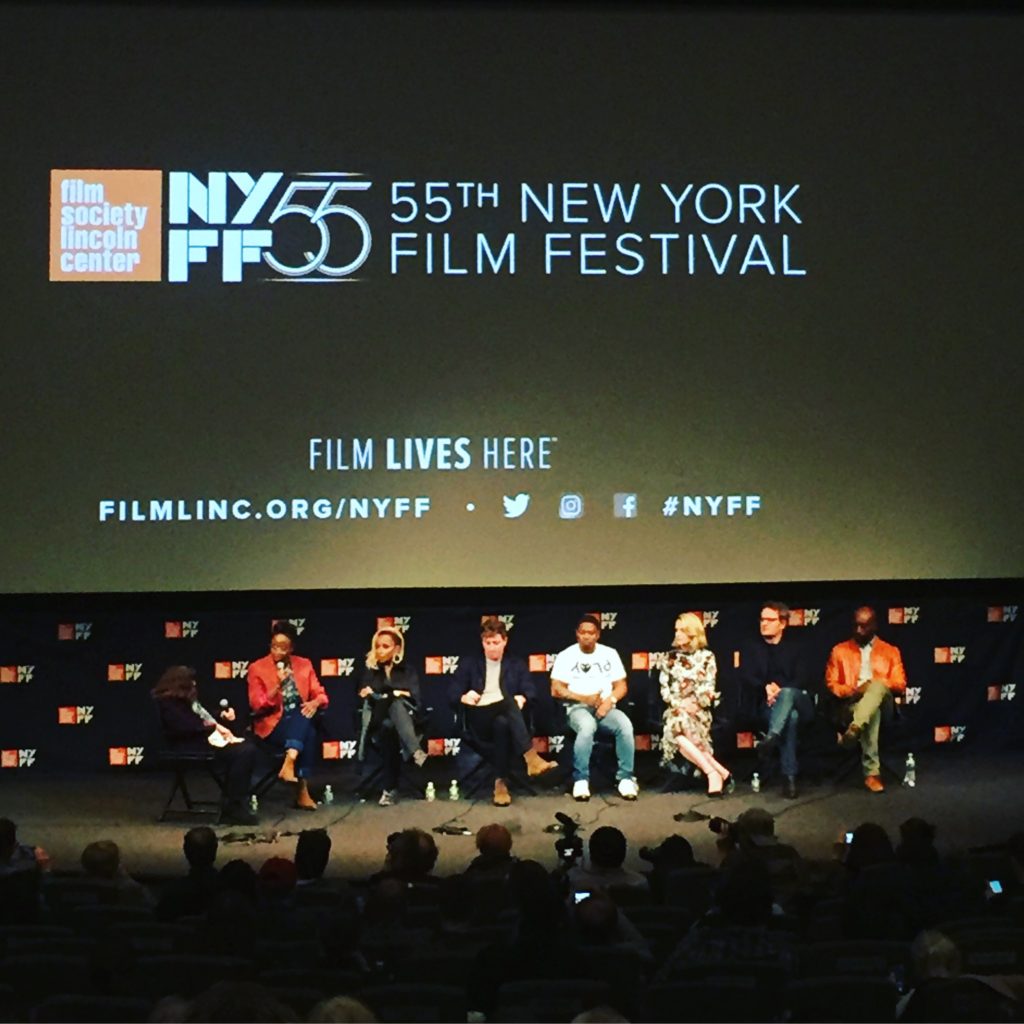
The Q&A session had director Dee Rees and actors Mary J. Blige, Garrett Hedlund, Jason Mitchell, Carey Mulligan, Jason Clarke and Rob Morgan in attendance. Here’s a run-down of their contributions:
Dee Rees spoke about her aims of constructing an old-fashioned film, without this financially-motivated 90-minute structure ingrained so deeply into most major studios’ considerations. She explained how any two of the characters in this story could’ve formed a two-hour film, easily, but that she was really keen on exploring a large group of characters and the dynamics therein. She wanted a “big scope”, in short.
Mary J. Blige explained that she had seen Pariah) and was therefore impressed with Rees, and that once her agent had sent her the screenplay to Mudbound, she was sold. She was able to get into character by focusing on her mother, and all the strong women in her life. Blige also commented on how she appreciated the tone and message of the ending.
Garrett Hedlund loved the script. In his words, he found it “beautiful, painful, brutal” and “poetic,” which is a perfect encapsulation, in my opinion. He felt the need to be a part of that, which was even more amplified once he then watched Pariah.
Jason Mitchell spoke about the projects he’d been offered during this time, and how he might’ve been able to pop his head into a few films, none of the stories or characters were substantial enough. Mudbound was an immediate winner to him and his desire to play fleshed out characters, and he sounded extremely enthusiastic about his determination to get this role. He found relatability to Ronsel’s character by looking at his father, and black men in general. He thought of Ronsel as beautiful, but militant – and that was a huge attraction for Mitchell. Most importantly, though, Mitchell expressed how amazed he was at the chance to be in a film with Jason Clarke.
Carey Mulligan explained how she’d been in a slew of period-piece dramas, and was hesitant to join yet another one. But once she’d seen Pariah and read the script to Mudbound, she was sold.
Jason Clarke apparently skyped with Rees while the director was in a parking lot outside of Costco. He was strongly attracted to the material, but feared oversentimentality seeping in. He jokingly called his character, Henry, a “good-hearted, decent racist,” which caused an eruption of laughter in the audience – but Clarke really understands Henry and was making a good point about the role in this dynamic being explored. He liked the realism of the story, and said that struggle is part of life, but that it doesn’t have to be bitter or dark. This really spoke to the overall tone of Mudbound, and in particular, the ending.
Rob Morgan correctly pointed out that a huge plus of joining this project was the fact that you’d get to hug Mary J. Blige. He’d also worked with Rees on Pariah, so he was immediately agreeable on working with her again. He stated that you always see blacks in chains or hosed down in films, but never get to see that netherworld between being a slave and having total freedom, encapsulated by this share-cropping era in the US.
Regarding preparation, this project only had a mere week – including wardrobe, rehearsal, etc. Part of that rehearsal was getting the word “nigger” to roll off the tongue as nonchalantly as any other word. Rees had the actors do an exercise where they’d simply repeat a sentence like the following, rapidly, without emotion: “cow truck dog sky nigger fog house” and “you’re a good nigger, thank you, sir, you’re a good nigger, thank you, sir, you’re a good nigger, thank you, sir.” This is the kind of honesty and discomfort required for crafting a good film on this material, and Rees seemed absolutely adamant about that more than most other things she touched on during this Q&A session. She said she didn’t want a “representational depiction,” the effort involved in combatting that being evident in the end product.
Rating: 8/10
Leave your thoughts on Mudbound review and Mudbound below in the comments section. For more film reviews, visit our Movie Review Page, our Movie Review Facebook Page, our Movie Review Google+ Page. Want up-to-the-minute notifications? FilmBook staff members publish articles by Email, Twitter, Tumblr, Google+, and Facebook.
Related Articles
FilmBook's Newsletter
Subscribe to FilmBook’s Daily Newsletter for the latest news!




